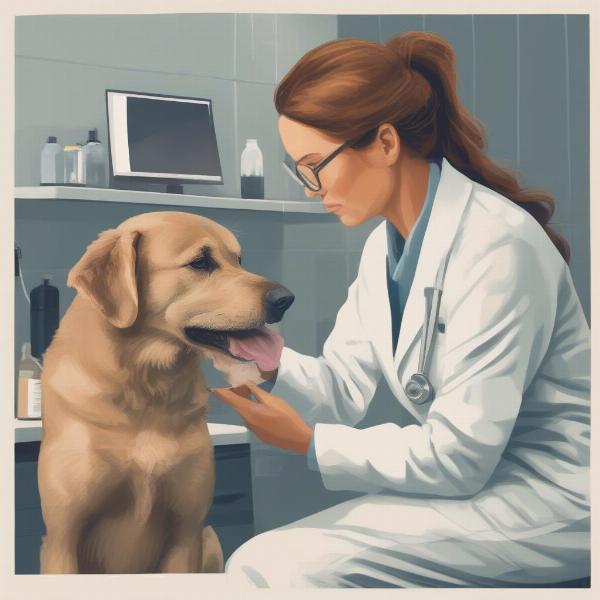Quercetin for dogs has gained popularity as a natural supplement with potential health benefits. But what exactly is quercetin, and is it safe and effective for your canine companion? This comprehensive guide will delve into the uses, benefits, risks, and dosage of quercetin for dogs, providing you with the information you need to make informed decisions about your dog’s health.
Understanding Quercetin: What is it?
Quercetin is a flavonoid, a type of plant pigment found in various fruits, vegetables, and grains. It’s known for its antioxidant and anti-inflammatory properties, which can be beneficial for both humans and animals. While research on quercetin’s effects on dogs is still ongoing, preliminary studies suggest it may play a role in managing certain health conditions.
Potential Benefits of Quercetin for Dogs
Quercetin’s antioxidant and anti-inflammatory properties may offer several potential benefits for dogs:
- Allergy Relief: Quercetin may help reduce allergic reactions by stabilizing mast cells, which release histamine, a key mediator in allergic responses. Itching, skin inflammation, and other allergy symptoms might be alleviated with quercetin supplementation.
- Joint Health: The anti-inflammatory effects of quercetin may help manage osteoarthritis and other joint conditions by reducing pain and inflammation.
- Cancer Support: Some research suggests that quercetin may have anti-cancer properties, potentially inhibiting the growth and spread of certain types of tumors in dogs. However, further research is needed to confirm these findings.
- Immune System Boost: Quercetin’s antioxidant properties may contribute to a stronger immune system, helping dogs fight off infections and diseases.
Risks and Side Effects of Quercetin for Dogs
While quercetin is generally considered safe for dogs, some potential side effects should be considered:
- Gastrointestinal upset: Diarrhea and vomiting can occur, especially with higher doses.
- Kidney issues: In rare cases, quercetin supplementation has been linked to kidney problems. Monitoring kidney function is essential, especially for dogs with pre-existing kidney conditions.
- Drug interactions: Quercetin may interact with certain medications, such as antibiotics and chemotherapy drugs. Consulting with your veterinarian is crucial before administering quercetin if your dog is taking any other medications.
Dosage and Administration of Quercetin for Dogs
The appropriate dosage of quercetin for dogs varies depending on the dog’s size, weight, and health condition. It’s essential to consult with your veterinarian to determine the optimal dose for your dog. Quercetin is available in various forms, including capsules, tablets, and powders. Following your veterinarian’s instructions and administering the correct dosage is crucial to avoid potential side effects.
 Veterinarian Examining a Dog
Veterinarian Examining a Dog
Is Quercetin Right for Your Dog?
Quercetin may be a beneficial supplement for dogs with certain health conditions. However, it’s crucial to consult with your veterinarian before giving quercetin to your dog. They can assess your dog’s individual needs and determine if quercetin is appropriate, as well as recommend the correct dosage and monitor for any potential side effects.
Conclusion
Quercetin shows promise as a natural supplement for dogs, potentially offering benefits for allergies, joint health, and immune function. However, it’s important to approach its use with caution, consulting with your veterinarian before starting supplementation. By working with your vet, you can make informed decisions about your dog’s health and ensure they receive the best possible care.
FAQ
- What foods are high in quercetin for dogs? Apples (without core and seeds), blueberries, and cranberries are good sources.
- Can I give my dog human quercetin supplements? No, always consult your vet for the correct dosage and formulation for dogs.
- Are there any known drug interactions with quercetin for dogs? Yes, it may interact with some antibiotics and chemotherapy drugs.
- What are the signs of a quercetin overdose in dogs? Severe gastrointestinal upset and potential kidney problems.
- How long does it take for quercetin to work in dogs? Effects can vary, but some improvements may be seen within a few weeks.
- Can pregnant dogs take quercetin? Consult your vet before giving quercetin to pregnant or lactating dogs.
- Is quercetin a cure for allergies in dogs? No, it can help manage symptoms but isn’t a cure.
ILM Dog is a leading online resource for dog owners worldwide, providing expert advice on all aspects of dog care, from breed selection and health to training and nutrition. We are dedicated to helping you provide the best possible care for your canine companion. For expert guidance tailored to your dog’s specific needs, contact our team at [email protected] or call us at +44 20-3965-8624. ILM Dog offers comprehensive information on various dog breeds, health concerns, training techniques, and nutritional advice. Explore our website today for more valuable resources to help you keep your dog happy and healthy!